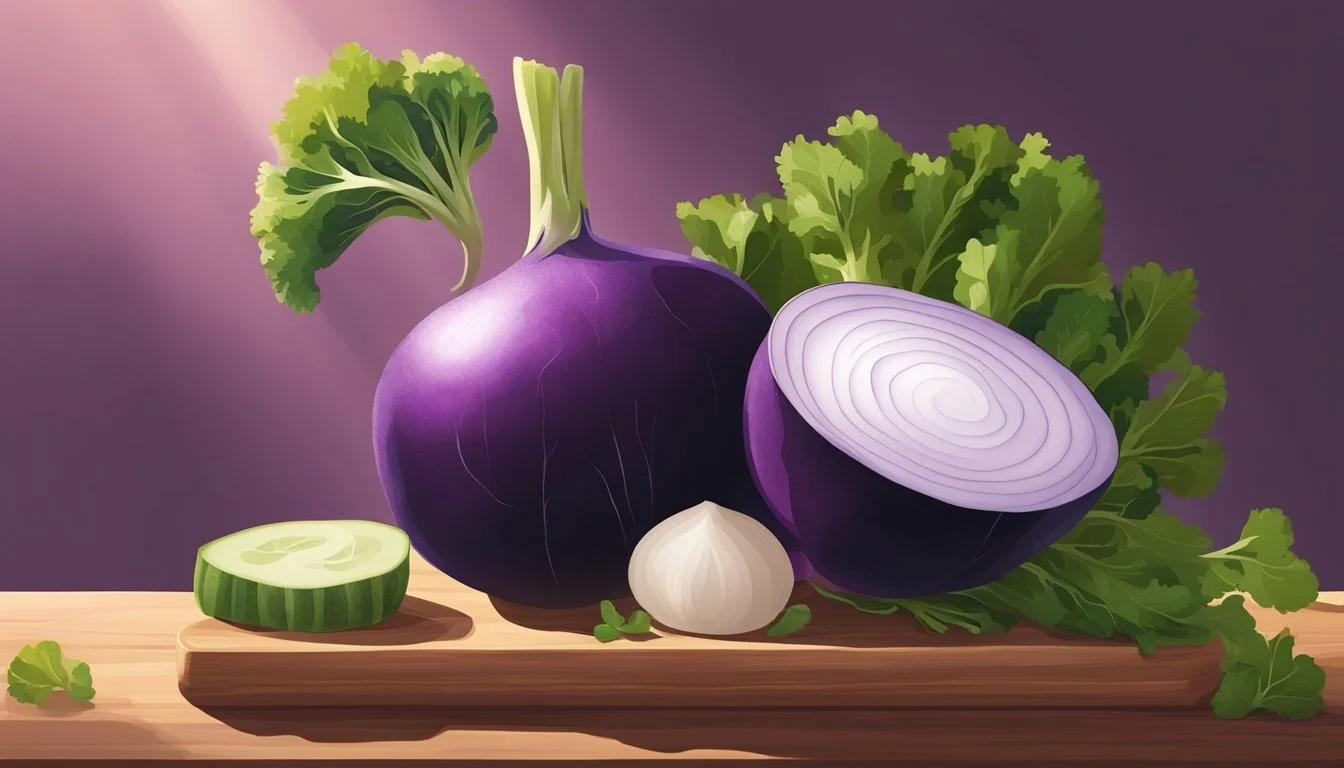What Are the Health Benefits of Black Radish?
Unveiling Nutritional Powerhouse Effects
Black radish, a root vegetable with a distinctive black exterior and white flesh, has been utilized for its medicinal properties for centuries. Recognized for its pungent and spicy flavor profile, this cruciferous plant stands out not only in culinary applications but also in the health benefits it offers. Rich in vitamins, minerals, and antioxidants, black radish has been linked with a multitude of health-promoting effects.
Regular consumption of black radish can support liver health, aid digestion, and act as a detoxifying agent. It contains compounds such as glucosinolates and isothiocyanates, which are thought to have protective effects on the liver, helping in the detoxification process. Additionally, the fiber content in black radish can contribute to improved digestive function, working to prevent constipation and reduce bloating.
Beyond its internal health benefits, black radish is also credited with contributing positively to skin and hair health due to its vitamin C content. This essential nutrient acts as an antioxidant, challenging free radicals, and promoting overall vitality. Furthermore, black radish has been associated with the potential to manage hormone levels, control blood pressure, lower cholesterol levels, and provide a boost to mental alertness, although these benefits warrant additional research to fully understand their scope and mechanisms.
Nutritional Profile and Key Constituents
Black radish is a robust source of essential nutrients, which play a pivotal role in maintaining various bodily functions. This section delineates the vitamins and minerals, antioxidants and phytochemicals, as well as the fiber content that underscores black radish's contribution to digestive health.
Vitamins and Minerals Content
Black radish provides a spectrum of vital vitamins and minerals. It is notably rich in vitamin C, an important antioxidant, and contains minerals like potassium, iron, magnesium, and calcium. The presence of Vitamin B-6, folate, and other B-complex vitamins also contribute to overall vitality.
Vitamin C: Essential for immune support and scurvy prevention.
Potassium: Regulates blood pressure and heart health.
Iron: Vital for blood production and oxygen transport.
Magnesium: Supports muscle and nerve function.
Calcium: Crucial for bone health.
Antioxidants and Phytochemicals
The root harbors a suite of antioxidants and phytochemicals like glucosinolates and isothiocyanates, which are known for their detoxifying properties. These compounds assist in liver protection and the elimination of free radicals.
Glucosinolates & Isothiocyanates: Help in liver detoxification and may have anti-cancer properties.
Flavonoids & Anthocyanins: These antioxidants help combat oxidative stress from free radicals.
Dietary Fiber and Digestive Health
Black radish is enriched with dietary fiber, which facilitates digestion and can help alleviate constipation. Fiber contributes to a feeling of fullness, potentially aiding in weight management, and maintains healthy gut flora.
Dietary Fiber: Important for bowel regularity and digestive health.
Health Benefits and Therapeutic Uses
Black radish has garnered attention for its potential health benefits, which span a spectrum of therapeutic uses, including support for cardiovascular health, cancer prevention, weight management, and immune system fortification.
Cardiovascular Health
Black radish is rich in potassium, which helps regulate blood pressure and supports normal heart function. Regular consumption can contribute to lower cholesterol levels, thereby reducing the risk of heart disease. Additionally, black radish's ability to detoxify the blood may further support cardiovascular health.
Cancer Prevention and Detoxification
Glucosinolates and isothiocyanates in black radish are known for their anticancer properties. These compounds play a role in detoxifying enzymes in the liver and may help in the prevention of certain cancers. Its detoxification properties also aid in clearing toxins from the body, which can contribute to overall wellness.
Weight Management and Metabolic Function
The low-calorie content of black radish, coupled with its dietary fiber, supports weight loss by promoting satiety and reducing the urge to overeat. It also assists in regulating metabolism and maintaining stable blood sugar levels, providing sustained energy without the fat accumulation associated with high-calorie foods.
Immune Support and Inflammation Reduction
Black radish is a source of vitamin B9, which contributes to the proper upkeep of the body's immune system. Due to its anti-inflammatory compounds, black radish can reduce inflammation and bolster immune health. By regulating the immune system, it also helps reduce tiredness and alleviates digestive discomfort, lending to its therapeutic uses in managing overall health.
Culinary Uses and Preparation
Black radish can be enjoyed in various culinary applications due to its distinctive flavor and nutritional profile. It is often used to enhance meals with its pungent and slightly bitter taste.
Incorporating Black Radish in Meals
One can integrate black radish into their diet by adding it to salads for a crunchy texture and a spicy kick. Thinly slicing or grating the radish allows it to blend well with other salad ingredients. For cooked dishes, black radish can be roasted, sautéed, or included in soups. When roasted, it turns milder and slightly sweet, making it a nutritious addition that complements a wide array of flavors. Sautéing black radish is another common method, which softens its texture and melds its earthy flavor with other components in the dish.
Salads: Slice raw for a peppery addition.
Roast: Cube and coat with olive oil before roasting to soften the bite.
Sauté: Combine with other vegetables for a savory side dish.
Soups: Chop and add to broths for depth of flavor.
Preservation and Enhancement of Nutritional Value
To maintain the nutritious benefits of black radish, it should be prepared in ways that preserve its vitamin and mineral content. Pickling is a popular method of preservation that also mellows its potent flavor. One can pickle black radish using vinegar, water, and salt, which can then be used to garnish dishes or enjoyed as a snack. Additionally, when cooking black radish, using methods like steaming or quick sautéing rather than prolonged cooking can help retain its beneficial compounds.
Pickled: Submerge in a mixture of vinegar, water, and salt for preservation and flavor moderation.
Steaming/Sautéing: Cook briefly to retain maximum nutritional value.
Considerations and Potential Side Effects
When incorporating black radish into one's diet, it's essential to be aware of possible allergies and how it may interact with certain medications or medical conditions.
Allergies and Intolerances
Allergies: While black radish is not commonly known to be a major allergen, individuals may experience an allergic reaction if they have a sensitivity to cruciferous vegetables. Symptoms can include itching, swelling, and gastrointestinal distress.
Intolerances: A high fiber content is characteristic of black radish, which can lead to digestive issues such as bloating, gas, or diarrhea in some individuals. It is advisable to start with small amounts and slowly increase the intake to mitigate these effects.
Interactions and Contraindications
Medicinal Interactions: Certain components in black radish may affect how the body processes drugs, altering their efficacy. For example, the plant's root contains chemicals that might modify liver enzymes responsible for medication metabolism.
Contraindications: Those with gallstones or biliary tract obstructions should avoid black radish, as it can stimulate bile flow. Furthermore, because of its potential impact on hormone levels, individuals with thyroid conditions or hormonal imbalances should consult healthcare providers before consumption.
Frequently Asked Questions
This section addresses some of the most common inquiries about the health benefits and nutritional aspects of black radish.
What nutritional value does black radish provide?
Black radish is a low-calorie vegetable rich in dietary fiber and vitamin C. It contains important minerals such as potassium and magnesium, and is also a source of antioxidants.
How might black radish juice contribute to overall wellness?
Black radish juice, known for its detoxifying properties, may support the immune system and improve liver function. Its high vitamin C content can also contribute to the prevention of scurvy.
In what ways can black radish impact skin health?
Due to its vitamin C and antioxidant content, black radish may aid in maintaining skin health by combating free radicals and might also contribute to reducing the appearance of dark spots.
Can eating black radish assist with liver health issues?
Black radish has been recognized for its ability to help in liver detoxification and may aid in the reduction of gallstones, thus, supporting overall liver health.
What are the possible side effects of consuming black radish?
While generally considered safe for most people, black radish can cause an upset stomach or an allergic reaction in some individuals. Due to its spicy nature, it may also irritate the digestive tract in sensitive persons.
How is a Spanish black radish supplement beneficial for health?
Supplements made from Spanish black radish may offer the same health benefits as the fresh vegetable, including digestive aid and liver support, but in a more concentrated form.




